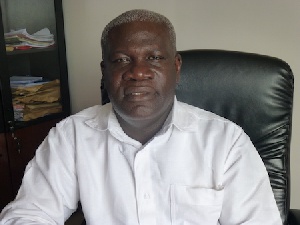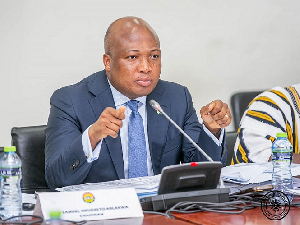The Industrial and Commercial Workers Union (ICU) of TUC has urged government to slow down its excessive spending on some development projects that cannot give returns within the stipulated time but are just for political expediency.
“In the past 4 years the country’s debt stock has increased by a whopping US$80billion, thus widening the GDP to debt ratio gap; aside from that all the key institutions in the country -- the Volta River Authority (VRA), Electricity Company of Ghana (ECG), Ghana Grid Company (GRIDCO), Ghana Water Company Limited (GWCL) and furthermore the ministries -- are full of toxic debts,” said Mr. Solomon Kotei, General Secretary of ICU when he spoke with the media in Accra.
Mr. Kotei touched on a wide range of pertinent economic issues and explained that if the rate of borrowing and spending by government is not reduced to the minimum, it will have serious repercussions on the lives of citizens.
He said the utility companies have no justification to increase tariffs at all since previous hikes have not seen any proportional improvement in their services, but customers continue to pay for such poor services. He said for instance some industrial concerns within the ICU were paying GH¢40,000 a year on power from ECG, but this amount shot up to GH¢105,000 without any corresponding improvement in service delivery.
Mr. Kotei said the tariff however compelled some institutions to become vulnerable and subsequently fold up, and cited Weinco which was closed down in 2014 as a result of high tariff vis a vis its returns.
The ICU General Secretary said the National Labour Commission needs to be decentralised for each of the 10 regions, to an office that speedily resolves labour issues. The situation where the whole country with about 27 million people has only one office in Accra to handle the huge labour issues is preposterous. He says the worst of it is that Commissioners at the Commission are part-time officers, and the result of this is that a lot of cases cannot be disposed of within time.
Moreover, the Commission having the status of a High Court but no enforceable powers makes it extremely difficult to settle labour disputes speedily and amicably as enshrined in its mandate. Mr. Kotei concluded that the perception in the public domain that he is anti-government and always resorts to demonstrations rather than having a dialogue is baseless: “As a leader of a very powerful labour union, I have the prerogative to fight for the rights and dignity for my workers when the need arises”.
Click to view details



Business News of Tuesday, 8 March 2016
Source: B&FT
ICU cautions gov’t against excessive spending
Entertainment
















